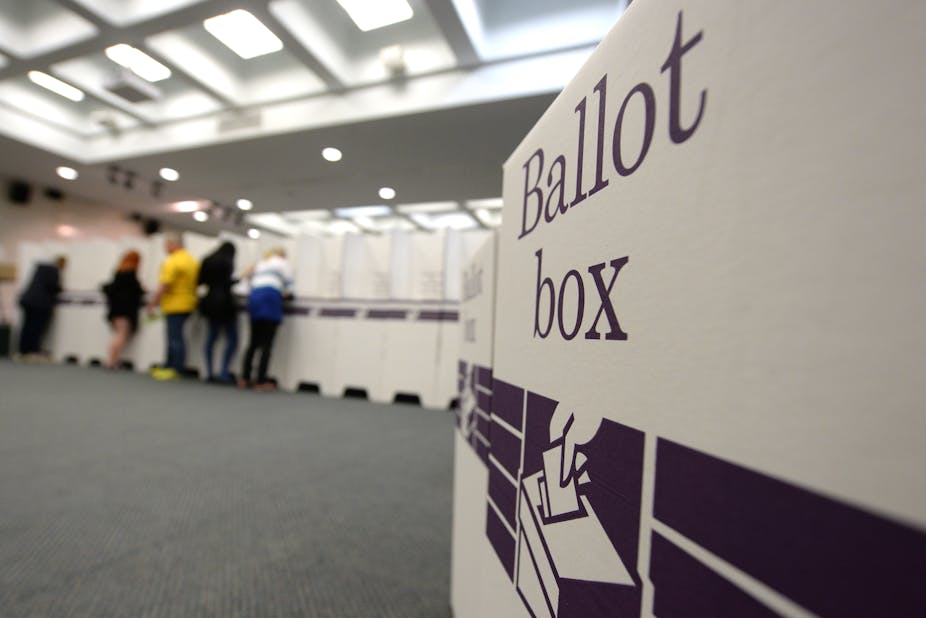It appears certain that Western Australians will vote in fresh Senate elections later this year. Following the initial vote last September and the recount – when 1375 votes were unable to be located – the High Court, sitting as the Court of Disputed Returns, declared yesterday that:
The only relief appropriate is for the election to be declared void.
While reserving its final judgment for Thursday, a new election to elect six senators seems to be an inevitability.
The court’s decision isn’t going to recast the political landscape. And yet it’s back to the polls that Western Australians will likely go. That means new candidates and new campaigns. And more fun – unless you’re feeling election fatigue (Western Australians did have state and local government elections as well as the federal election last year).
So, what will be the key issue areas a re-vote will be fought on?
The major parties
The Coalition will urge Western Australian voters to allow the Abbott government to govern. After all, it won a significant majority in the House of Representatives last September.
Prime minister Tony Abbott will generally play better in Western Australia than opposition leader Bill Shorten. They are both from “over east”, so neither really understands WA, but Abbott can run a pro-development line more believably than Shorten.
The latest Nielsen poll appears to reflect Shorten’s inability to engage voters outside the party while he tries to rebuild inside the party. He is being outmanoeuvred in public, however much they lionise him inside the party.
Late last year, when a re-run was first mooted, some media outlets suggested that the fresh election will be a referendum on the carbon tax. It is unlikely to be that simple. This is especially so if there is enough evidence to show that the carbon tax is working, which the IMF certainly thinks is the case.
But an election re-run is likely to play out better for the conservatives. It is hard to see the Liberals losing or gaining a seat. It is more about the fate of the Palmer United Party (PUP) and the Greens.
Much of the hostility to Labor has been vented in Western Australia, so Coalition strategists shouldn’t assume they can rely on strong anti-Labor sentiments to carry them through. Presenting themselves as the government that has stopped asylum seekers will work well in WA, where arrivals by boat have had a greater impact than elsewhere.
However, the secrecy around asylum seekers coming by boat is making the public’s reaction to this issue hard to predict.
State issues
One problem for the Coalition is that Western Australians know the Abbott government won’t do anything to increase the amount of Goods and Services Tax (GST) the state receives.

While it was never directly stated, the view that Labor had something to do with WA’s share of GST revenue was left conveniently – for the Coalition – in the air for much of last September’s federal election. Now it is clear that the Coalition will do nothing for a state government struggling, and failing, to balance its budget.
This is why Labor will want the election to be about the effectiveness of Coalition governments. The ALP campaign will attempt to shift the focus from federal Labor and use WA premier Colin Barnett’s woeful recent performance as evidence that Coalition governments across Australia aren’t up to the challenges of governing.
Abbott will struggle to persuade people to support him because of his record. The federal government has done little so far that will have particularly impressed West Australians. The carbon and mining taxes are not such “hot” topics, so they do not carry the same weight.
The Greens, PUP and microparties
The Greens can regain ground if they can establish themselves as being necessary to moderate the excesses of the Abbott government, and to generally ensure that the government does not lose sight of the environment in pursuing jobs growth.
It would help, in Western Australia, for the Greens to articulate a conservative environmental position. This is not the state to be anything but conservative.
Incumbent senator Scott Ludlam, who was elected for the Greens in the recount, argued to keep the recount instead of publicly welcoming the challenge to respond to those who have turned away from the Greens. That would have sent the right message to voters.
The Greens are likely to join the Coalition and Labor in trying to make a re-run election about microparties manipulating the voters to get candidates elected who gained very few first preference votes. Expect to see Glenn Druery - the so-called “preference whisperer” - copping a lot of criticism.
The Greens ought to be careful with the microparties. Support for them expresses discontent with the system, which is also manifested in votes for the Greens. Dismissing other people’s discontent in favour of your discontent won’t win you friends. Besides, the Greens need to think about possibilities for working with any microparty candidates who are elected.
A re-vote solely in Western Australia provides the PUP with a great opportunity. The new party’s success in September’s election means that the PUP now represents a credible option for those attracted by a conservative approach.

Palmer’s very deep pockets will help the PUP to generate a significant profile in traditional and social media. So, the PUP can expect to repeat its (albeit voided) success of winning a Senate seat in WA. There’s always the chance that Palmer will say something to offend Western Australians, but he speaks fluent mining magnate, which is a language that people in the state understand well.
The mainstream media is helping the major parties’ attempts to make microparties appear sinister and manipulative, so we are likely to see people not trusting them with their “above the line” preferences.
The Sports Party, which won a seat in the disputed recount despite gaining just 0.23% of the first preference vote, will also struggle.

